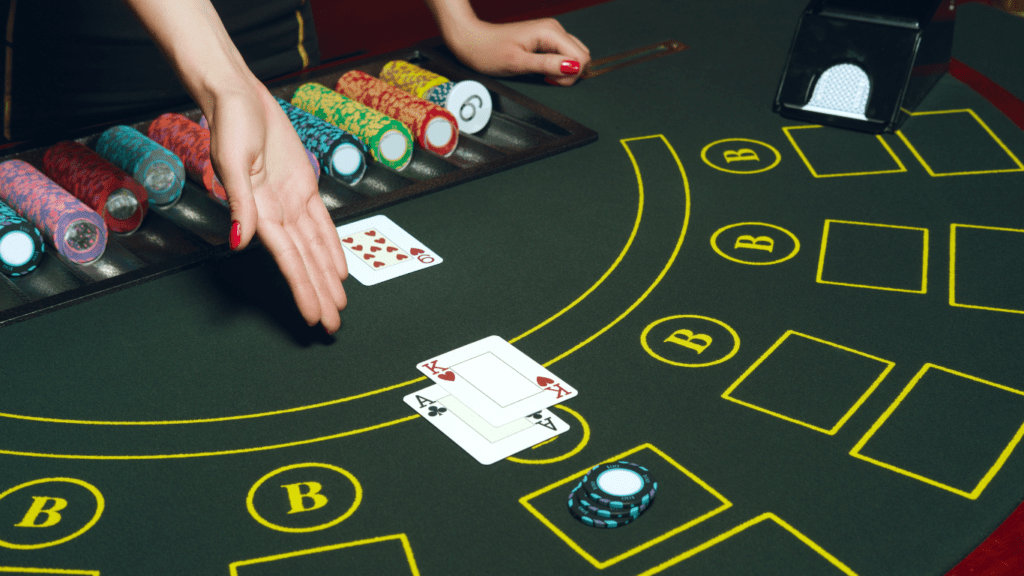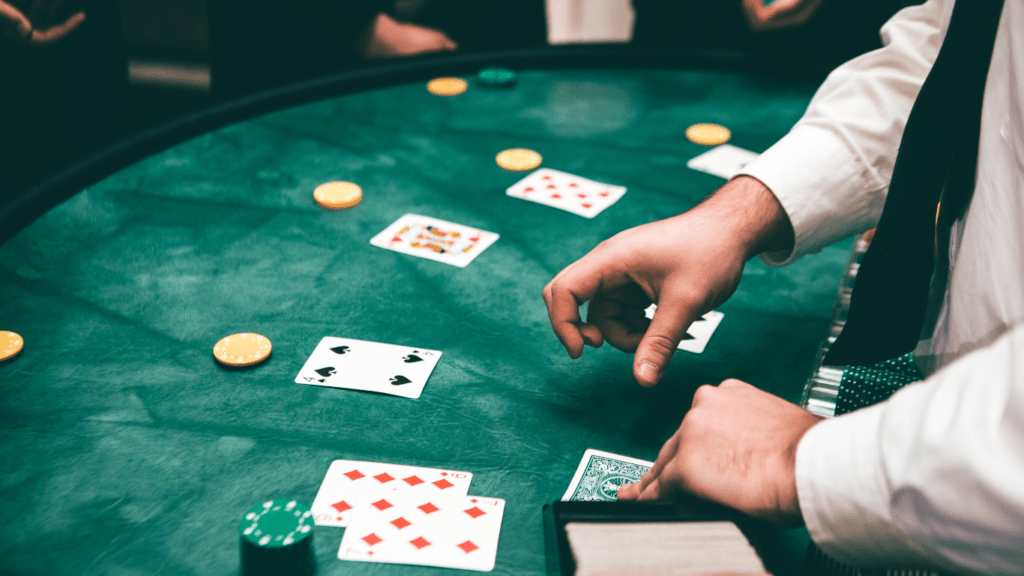Understanding Blackjack Myths
Misconceptions about Blackjack often cloud the reality of the game. Players hear myths from various sources and may adopt beliefs that don’t hold up under scrutiny.
Myth 1: Card Counting Is Illegal
Card counting isn’t illegal. Casinos can ask you to leave if they suspect you, but it’s a legitimate strategy. Unlike cheating, counting cards relies on memory and observation. For example, tracking high and low cards can inform betting decisions.
Myth 2: You Must Get as Close to 21 as Possible
Players often think hitting 21 is crucial. However, the real aim is to beat the dealer’s hand. Sometimes standing on a lower total is the best strategy. For instance, if the dealer shows a weak upcard, standing on 12 or higher might be wise.
Myth 3: The Dealer Always Wins
It’s easy to think the dealer has the upper hand. In reality, Blackjack has one of the lowest house edges if played correctly. Optimal strategies, such as basic strategy charts, improve winning chances. This approach minimizes the house edge to around 0.5%.
Myth 4: Winning Streaks Mean You’re Due for a Loss
Believing a loss follows a winning streak is a gambler’s fallacy. Each hand is independent, and past outcomes don’t affect the next deal’s results. For example, winning five hands in a row doesn’t mean the sixth hand will be a loss. Stick to your strategy consistently.
Myth 5: Other Players Affect Your Chances
Many think others at the table impact their odds. This isn’t true. Blackjack is played against the dealer, not other players. Individual decisions don’t alter the deck’s overall probabilities significantly. Focus on your gameplay and strategy.
Myth 6: The Order of the Cards Matters
It’s believed shuffling and card order change outcomes. Random shuffling ensures fair play, but players should know it’s still a game of probabilities. Regardless of the order, using a consistent strategy is key to long-term success. For instance, knowing when to hit, stand, or split based on the cards shown can lead to better outcomes.
Myth 7: Slot Machines Affect Blackjack Tables
Some think slot machine payouts influence card games. Slots and table games operate independently. Winning at one doesn’t mean losing at the other. Each operates on unique algorithms and probabilities. Playing Blackjack well relies solely on strategy.
Understanding these myths helps make better decisions at the Blackjack table. Knowing the game’s reality reduces confusion and improves playing experience.
Common Misconceptions
Many myths cloud the game of Blackjack, making it harder for players to grasp its nuances. Let’s clear up some common misconceptions that could be affecting how you play.
Myth 1: Winning Streaks Mean You’re Due for a Loss
People think that after a few wins in a row, a loss is inevitable. This belief stems from the Gambler’s Fallacy, which inaccurately assumes that past outcomes influence future ones. In reality, each hand in Blackjack is independent of the previous ones. Winning streaks don’t predict future losses.
Myth 2: Card Counting Is Illegal
Contrary to popular belief, card counting isn’t against the law. Casinos dislike it and may ask counters to leave, but no law prohibits it. Card counting relies on skill and mental math, not cheating.
Myth 3: Dealers Always Have a 10 in the Hole
Some players assume that the dealer’s face-down card is always a 10. This leads to overly cautious strategy adjustments. In reality, only 30.8% of cards are worth ten points (10, J, Q, K). Assuming otherwise skews decision-making unnecessarily.
Myth 4: Using a Blackjack Strategy Is Cheating
Employing a basic strategy isn’t cheating; it’s smart play. Blackjack strategies optimize decision-making based on the dealer’s upcard and the player’s hand. Casinos recognize and accept this; it levels the mathematical playing field.
Unveiling the Truth
In this section, I’ll clarify some prevailing myths in Blackjack, focusing on core aspects that often confuse players.
Reality of Winning Streaks
Many players believe that winning streaks predict upcoming losses. This myth persists because people often misinterpret random patterns. Each hand in Blackjack is statistically independent of previous hands. The cards dealt in one round have no bearing on the next. A player could win five consecutive hands or lose five in a row without any predictable pattern.
Legalities of Card Counting
Card counting isn’t illegal, though many casinos frown upon it. Casinos reserve the right to ask players to leave if they’re suspected of card counting. Unlike in movies, using mental math to keep track of cards doesn’t equate to breaking the law. Reputable sources, including experts, confirm that players won’t face legal consequences.
Dealer Hole Card Probabilities
Another common myth is that dealers always hold a 10 in the hole. Statistically, there are 16 ten-value cards in a deck of 52 cards. This means the probability of the dealer having a 10 in the hole is around 30%. Misunderstanding this probability can mislead players, causing them to make poor decisions based on faulty assumptions.
Legitimacy of Blackjack Strategies

Some think using a strategy in Blackjack is tantamount to cheating. In reality, basic Blackjack strategies are legitimate and help reduce the house edge. Strategies are based on mathematical principles and statistical analysis, guiding players on when to:
- hit
- stand
- split
- double down
Embracing these strategies can improve player outcomes without infringing on any rules.
By understanding these truths, Blackjack players can better enjoy the game and make more informed decisions.
Impact of Myths on Players
Blackjack myths can distort players’ understanding of the game. Believing these myths influences decision-making and results.
False Sense of Security
Players often feel overly confident due to myths. For instance, thinking that a winning streak guarantees continued success might lead to riskier bets. This overconfidence can result in larger losses.
Without understanding the randomness of each hand, players might not manage their bankroll effectively, leading to potential financial issues. For example, assuming a dealer always has a 10 in the hole might make players hesitant to hit, which could hurt their strategy.
Misdirected Strategy Choices
Misguided beliefs can result in poor strategy decisions. If players blindly trust myths instead of learning legitimate strategies, their gameplay suffers. For instance, believing card counting is illegal might deter players from considering it as a valid technique.
Meanwhile, ignoring the actual odds influences how players choose to hit, stand, or double down, reducing their chances of winning. Reliable strategies help reduce the house edge, but myths prevent players from using these approaches effectively.
Expert Opinions
Debunking Blackjack myths requires insights from professionals in the field. Knowing what the experts say helps separate fact from fiction.
Insights from Professional Players
Professional players stress the value of understanding probabilities over relying on myths. They know that myths like “hot streaks” can lead to poor decisions. Instead, they recommend focusing on statistically sound strategies.
According to experienced players, counting cards isn’t criminal but must be done discreetly and isn’t a guaranteed win. They also emphasize the importance of money management to prevent financial pitfalls driven by myth-based overconfidence.
Perspectives from Casino Managers
- Casino managers often encounter players swayed by myths.
- They note that many believe the dealer always has a 10 in the hole, which isn’t statistically accurate.
- This misconception often leads to poor betting decisions.
- Managers highlight that casinos monitor for card counting, and while it’s not illegal, it can result in players being asked to leave.
- They advise players to rely on basic strategies to reduce the house edge instead of unfounded beliefs.
These perspectives underscore the necessity of informed gameplay.

